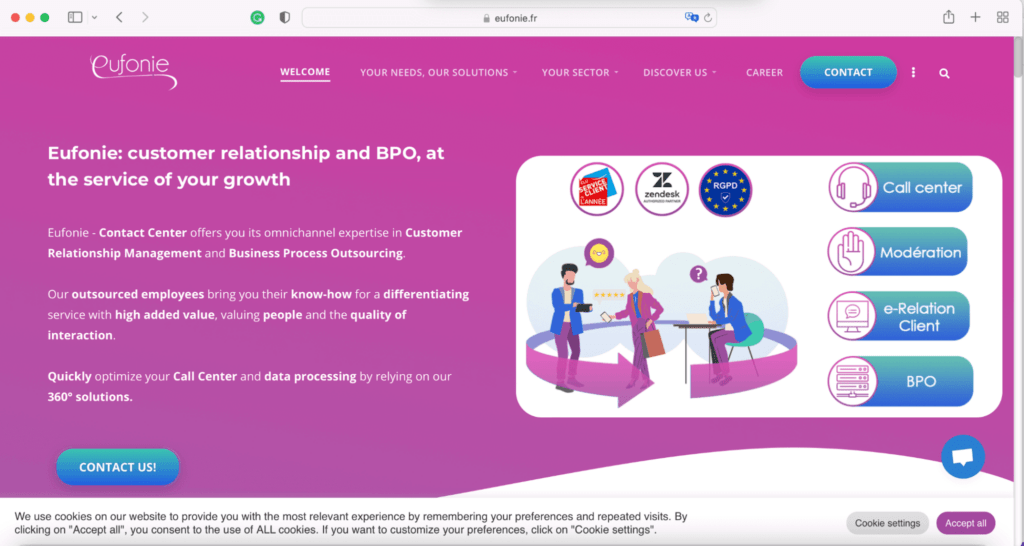If you run a Business Process Outsourcing firm, you already know it’s the best time for the BPO industry. Numerous businesses worldwide are relying on outsourcing companies to access work flexibility and cost-efficiency.
However, with the growing demand for Business Process Outsourcing services and the need to provide greater efficiency, outsourcing companies need a proper BPO management toolkit – now more than ever.
What’s that? Why’s it important?
Don’t worry. We’ll answer all your questions.
In this article, we’ll cover what BPO management tools are and dive into some effective management practices for BPO operations. We’ll also look at how the Time Doctor tracking tool helps your company with BPO management.
And finally, we’ll uncover the key benefits of successful BPO management and answer a few FAQs.
Table of Contents
- What is BPO management?
- 9 BPO management practices for effective operations
- How Time Doctor helps with BPO management
- 2 key advantages of successful BPO management
What is BPO management?
Business Process Outsourcing (BPO) management tools allow an outsourcing business to manage and supervise the services it delivers to clients.
Using BPO management tools, a business process outsourcing company like yours can ensure a seamless workflow between your company and the client’s business. They help a BPO manager quickly see what can be done to enhance the two companies’ processes, communications, and performance.
BPO management functions are primarily divided into two categories. Here are the types of BPO:
- Back office: Includes tasks like payment processing, accounting, billing, information technology services, auditing, quality assurance, etc.
- Front office: Includes departments like customer service or customer support, customer experience, marketing, and technical support.
The goal of the Business Process Outsourcing Management functions is to ensure that every BPO team is prepared with the correct information and tools needed to execute tasks efficiently.
Want to learn more about your business?
Here’s a quick Business Process Outsourcing guide.
But what are these management functions?
Let’s find out.
9 BPO management practices for effective operations
Here are some of the best practices that your Business Process Outsourcing management teams can implement to accomplish tasks with high-level efficiency:
1. Sign a mutually agreed upon contract
The BPO, as the third-party service provider, must draft with their client the service level agreement describing the quality of the BPO services and the metrics for deciding success.
The contract will also contain terms and conditions that are agreed between the BPO management and the client organization.
A reasonable and workable service level agreement that offers mutual benefits and promotes a healthy business alliance is crucial for efficient BPO operations.
Here are the two most important declarations you must include to become a BPO partner:
- The scope of BPO operations decided upon,
- The payments and other monetary responsibilities of both parties.
Not sure what else to include in your BPO contract?
Here are 12 points to add to your BPO agreement for healthy collaboration.
2. Hire the right agents
A BPO operations manager not only needs to find the best talent but also work with the client company’s culture, people, and Human Resources.
Here are some of the skills you should look for in an ideal candidate:
- Good communication skills
- Basic technology skills
- Fluency in the preferred language
- Knowledge retention
The HR and operations manager should devise a strategic plan and spend time on hiring and decision-making. This way, the BPO management, and the client business can enjoy the benefits of a quality team in the long run.
3. Create seamless human resources processes
The role of the Human Resources team doesn’t stop at hiring the right BPO employees.
In a BPO, they’re also responsible for providing a new employee with a proper onboarding experience to ensure a good first impression.
A good onboarding experience involves explaining your company’s culture and mission to the new recruits, so they get excited about working there.
Human Resources must continue to carry out its responsibilities throughout an employee’s stay with the company to ensure employee satisfaction within the BPO work environment and culture.
4. Execute standardized processes and policies
Adhering to a strict set of processes and policies will allow your BPO employees to trust your BPO manager and management. For example, the BPO management team should standardize policies on customer support call recordings, dress code, attendance, etc.
This will allow employees to work in peace as they’re aware of the clearly stated accountabilities and responsibilities.
Moreover, your BPO staff gets to enjoy a workplace that values a culture of clarity and transparency.
5. Provide continuous training to employees
BPO operations only succeed when the company has a highly qualified workforce.
Training is the most sustainable way to yield the highest efficiency and competitive advantage.
You can train your employees in areas like quick resolution of calls, subject matter expertise, and communication skills like empathy, patience, etc.
Some of these areas, like product knowledge, company policies, etc., may require the BPO management to keep up with the changing demands of the market.
An up-to-date and competent talent pool is critical when BPO operations continue to grow or need to support a more extensive client base.
6. Deploy workforce management tools
Workforce management (WFM) is all the processes a BPO undertakes to have the correct number of staff available as and when needed.
If you want your clients to be happy and businesses running, you need the right number of human resources at your disposal at all times.
The Workforce Management process includes four important aspects that you can accomplish with the help of WFM software:
- Predicting contact volumes.
- Scheduling staff around your predicted contact volumes.
- Managing daily tasks (considering unexpected peaks in contact volumes or absenteeism).
- Creating a Business Continuity Plan (BCP).
In other words, proper BPO management includes assigning the right employees with the right skills or specialization to the right business function at the right time — to meet demands.
Does your BPO have a call center?
Check out our call center workforce management guide.
7. Offer constructive feedback
Your BPO company can do market research and prepare a set of Key Performance Indicators (KPIs) to properly evaluate agents against set indicators and benchmarks.
Here are some BPO Key Performance Indicators:
- First call resolution (FCR)
- Net Promoter Score (NPS)
- Customer Satisfaction (CSAT)
- Call abandonment rate
The management needs to assess the Key Performance Indicators and state realistic, measurable ways to improve.
This way, you can let your BPO employees know that their services matter, and they’ll have a clear idea of where they need to work to improve performance.
8. Organize employee engagement initiatives
It’s the BPO management’s job to keep their employees engaged in work and develop recreational activities for fun.
It will make the BPO employees feel like they belong and understand that the management appreciates them.
Here are some employee engagement activity ideas:
- Workplace parties.
- Recognition programs.
- Team building activities like games and competitions.
- Invigorating training sessions.
- And more.
Overall, it’s fulfilling for team members to know that their contributions to the agency matter and that the company culture also promotes meaningful breaks from tedious work.
Need help with measuring employee engagement?
Here’s how to measure employee engagement and ways to improve it.
9. Employ high-quality technology
For successful BPO management, your outsourcing services company should use updated technologies. It keeps the BPO operations well-oiled and equipped to execute tasks and complete deliverables on time.
The latest technological tools can include:
- Communications platforms
- Project management software
- Data analysis software
- Automation tools
- Time Tracking software
For example, Time Doctor is a time tracking software that lets you record and measure your BPO employees’ work hours, attendance, and productivity levels accurately.
Investing in such advanced digital assets also means data security and protection, keeping the client and the management happy.
Now let’s check out how Time Doctor can help with business process outsourcing management.
How Time Doctor helps with BPO management
Here are two examples of two top BPOs to show you how Time Doctor is making BPO management much more efficient:
1. Phoenix Virtual Solutions

Client profile: Phoenix Virtual Solutions is a Philippines-based BPO company offering offshore staffing solutions and services for healthcare providers and management companies.
Challenges:
- Looking for the most affordable technology provider that can offer multi-functional monitoring of virtual assistants and ensure a secure virtual work environment
- Creating more visibility into their remote BPO workforce.
- Providing comprehensive data on efficiency and the total output of their offshore teams to their clients.
- Seeking a solution for client retention and leaving a positive impact on their client’s overall productivity and revenue.
The Time Doctor Solution:
- Time Doctor was the ideal tool for the company with brand recognition and popularity in the BPO industry.
- Phoenix Virtual Solutions could show clients that their virtual BPO assistants are performing efficiently and optimizing their time. It was made possible with Time Doctor’s features like Web & App Usage report, screencasts, productivity reports, and work schedules.
- Precise reporting and time tracking by Time Doctor has contributed to the company’s profits and made client billing and employee payroll accurate.
Overall Impression: With Time Doctor, Phoenix Virtual Solutions was able to build a reputation for clear and accurate reporting of offshore team work, increasing client retention, and acquisition.
2. Eufonie

Client Profile: Eufonie is a Madagascar-based offshoring and outsourcing consulting firm. It
offers omnichannel expertise in Customer Relationship Management (CRM) and Business Process Outsourcing.
Challenges:
- During the pandemic, Eufonie’s workforce had to transition to remote work. The business leaders wanted a tool that empowers agents to show their accountability.
- The company needed a tool for visibility and to inform clients of their work being completed on time.
The Time Doctor solution:
- Time Doctor was able to provide Eufonie with the data and accountability necessary to run a flexible and remote work environment efficiently.
- Workday Insights and real-time monitoring helped the BPO identify available times of employees, resulting in a 30% increase in overall productivity.
- With the Client Login Access feature, Time Doctor ensured that Eufonie’s clients could see what agent’s were working on.
- The tool’s screencasts allowed the Eufonie BPO owner to provide accurate, real-time proof of work to his clients and spot areas of improvement for the employees.
Overall Impression: 95% of Eufonie’s employees said they’re pleased to continue working remotely while using Time Doctor.
Looking to transition to remote work?
Here are five helpful tools for transitioning BPO workers to a productive remote work setup.
Now let’s look at some important reasons why your company needs BPO management.
2 key advantages of successful BPO management
It is the job of the BPO management team to streamline communication between the BPO and its outsourcing client.
Here are the key benefits your BPO management teams should be delivering:
1. Boosted productivity and overall performance
A successful BPO management team helps more employees to be more satisfied, resulting in work performance optimization and timely service delivery — ultimately benefiting businesses.
Satisfied employees also tend to lower the turnover rate and increase the retention rate of BPO agents.
Moreover, good BPO management practices provide training and growth opportunities to its BPO team members so they can grow professionally and attain skills to complete tasks faster and more effectively.
2. Increased profit margins
BPO companies are known for their round-the-clock business operations across the globe.
Since there’s no downtime for a BPO service provider, time is of the essence. So, when the BPO management team hires the best, most-skilled employees and trains them while giving objective feedback, the employees eventually generate larger revenues — adding to the bottom line of the BPO service provider.
With that said, let’s answer some questions related to BPO, Business Process Outsourcing services, and vendors.
Final thoughts
Demand for BPO services and outsourcing companies is increasing each day, as higher-level positions and advanced tasks are moving overseas in small businesses, startups, and large firms.
And since the contracts between a BPO vendor and its clients are typically long-term commitments, BPO management is necessary for smooth business operations and higher chances of success for both parties.
You’ll need proper hiring, standard policies, and the highest technology grade. Speaking of technology, Time Doctor is just the solution you need for BPO management. It lets you monitor work hours, productivity, workload, employee burnout, and more.
So why not get started?
Sign up for Time Doctor’s 14-day free trial so that you can manage your BPO, employees, and clients — all from one place!


